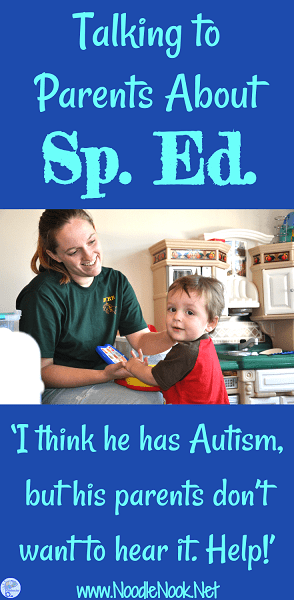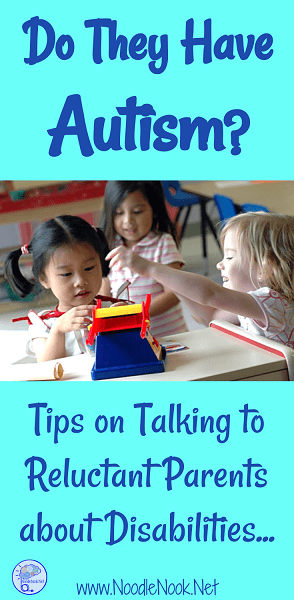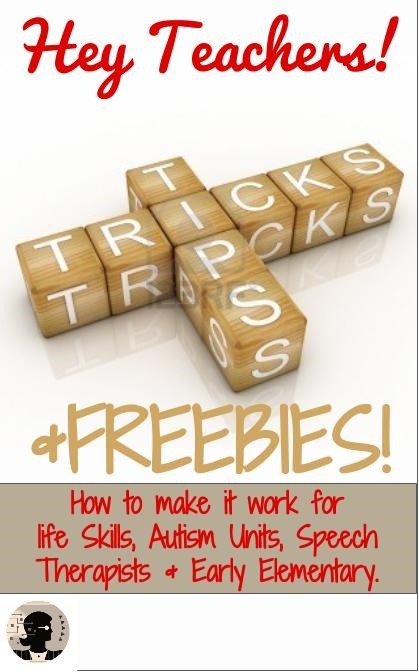Talking to Parents About Autism
Emails pour into the NoodleNook website for help on a variety of situations happening in classrooms all over the world. Every once in awhile I like to use the questions as blog posts to help not only the person asking the question, but also other people out there who may be dealing with the same issue.
This question comes from Kathryn from the East Coast and it reads:
“I have a child in my class, hasn’t been diagnosed as Autistic, but we suspect he is on the spectrum. He is high functioning – he is extremely bright. He is only 4, can read, knows his numbers up to 100, but has difficulty grasping his pencil. He can empathise and is very loving. He does not like to make eye contact and is very venerable as he just goes up to strangers and starts talking to them. Parents are finding it difficult to accept that there is something not right here. Help! What should I do?”
Talking to Parents about Special Education
No parent wants to hear that their child may have a disability. That is a hard pill to swallow.
I have never met the parents or child you are referencing and can only speak in general terms… please remember, I am a teacher, not a diagnostician or physician. I would think, just like any other parent, they would want to know their kid’s strengths as they are eased into a conversation on strategies they may need to use to address their child’s areas of need.
I would continue to mention their child’s stellar reading skills and offer them more ways to challenge him intellectually. Then offer a little bit more. Start slow with some simple things they can do around the house that are non-confrontational… like finger strengthening, pencil grip alternatives, or seeking the help of a physical therapist to address fine motor or writing delays. You may also suggest looking into alternatives to writing now, like voice to text or typing as many students become reluctant writers because they are not good at writing, not because they don’t have anything to say.
In addition, suggest role playing with their child before social situations and practicing what to say. Many children struggle with social interactions when they are younger. Having simple conversations with a parent on how to effectively teach social skills make curb some of the awkwardness. And maybe by slowly introducing these simple strategies to the parents, they will come to continue looking for ways to bridge any gaps as their child ages.
[dt_gap height=”10″ /]
Doing More in Our Classrooms
On our end as educators, we also need to look for ways to bridge the gaps we see in the moment and ones we anticipate may arise. Are there any ways to equip this student to be successful in the fast paced and collaborative learning environments that elementary is becoming? Can you work on alternative writing techniques while still developing finger strength and dexterity? Can you practice social skills and use social stories in your classroom with all your students? Remember, people with Autism often have increased anxiety and sensory processing difficulties. Anything you can do to better prepare this child to handle stress, anxiety, and sensory overload will mean they can be more successful in their later school years and in their adult lives.
[dt_gap height=”10″ /]
So What Should I Say?
There is absolutely not a script I can give you for making parents okay with Autism… The best we can hope for is that WE are aware and able to make good decisions in the best interest of our students and that we develop a relationships with parents that allows them to trust in us and our intentions. Another thing we have to remember is that we are just teachers. Parents can be very aware of what their child needs and where they need help… we can’t just assume they are oblivious. We also must remember we aren’t physicians. Most doctor’s visits these days screen for Autism and ask questions about normal development. Just because we think there is an unseen problem doesn’t mean there have not been screenings and doctor discussions we are not privy to. We do not have specialized training on diagnosing children. This is a fine line to walk, but always keep your student’s best interest in mind and respect your parents and their rights.
[dt_gap height=”10″ /]
Good luck Kathryn and keep me updated! I would love to know how your students finishes up the school year and if their parents ever open to the idea!
Do you have any suggestions to help Kathryn? Reply in the comments below.
Or do you have a question yourself that needs answering?
Send us a message using the contact form, we’d love to hear from you!






Hi I own a company , All About Kids , that is approved by New York State to perform the evaluations and therapy services for the Early Intervention Program ( ages birth -3 ) and the Special Education Preschool Program (ages 3-5) throughout the state. We are often contacted by preschool teachers who are at a loss of how to convey to parents their concerns to parents about their child. We often explain and recommend to them the following: Regardless of the diagnosis or delay which they suspect – even if it is autism -the teachers goal is not to provide a diagnosis ( this often is a relief ). The goal of the teacher is to get the parent to have their child evaluated by a professional who can determine and then explain if their child is exhibiting true delays ,problems in development or a diagnosis and at least in NY then possible eligibility for therapy services for the child at no cost to the parent. What the teacher can do is always start off by presenting a psostive statement about the child’s strengths but then convey and describe the concern objectively and without judgment. – Then follow up with the concern as it relates to his or her learning in class from the teacher or through interactions with his or her peers in class. For example – don’t say ‘your child is acting autistic when I speak to him ‘ but rather – I am concerned that your son consistently does not make eye contact or seem to focus at all when I speak to him one on one or when he is in a group with his friends. He is able to answer some of my follow up questions when he is asked but I am concerned this behavior may impact his full potential in learning in the class. We thought it might be a good idea at this point to get this checked out with an evaluation . We will be happy to support and integrate recommendations from the evaluation into the classroom to help your child. At his point , the parent can be redirected back to seeing the child’s pediatrician for a referral for an evaluation or if the teacher has a referral number for the state’s Early Intervention Program or Preschool Special Education that can be given to the parent.
Cathy,
I love your suggestions! I think as classroom teachers, we think we have to do and know everything. What you are saying really speaks to the fact that we are not diagnosticians. Our job is to steer parents in the right direction and do our best within the classroom.
Thanks for the insight, little reminder, and great script when speaking to parents!
Comments are closed.